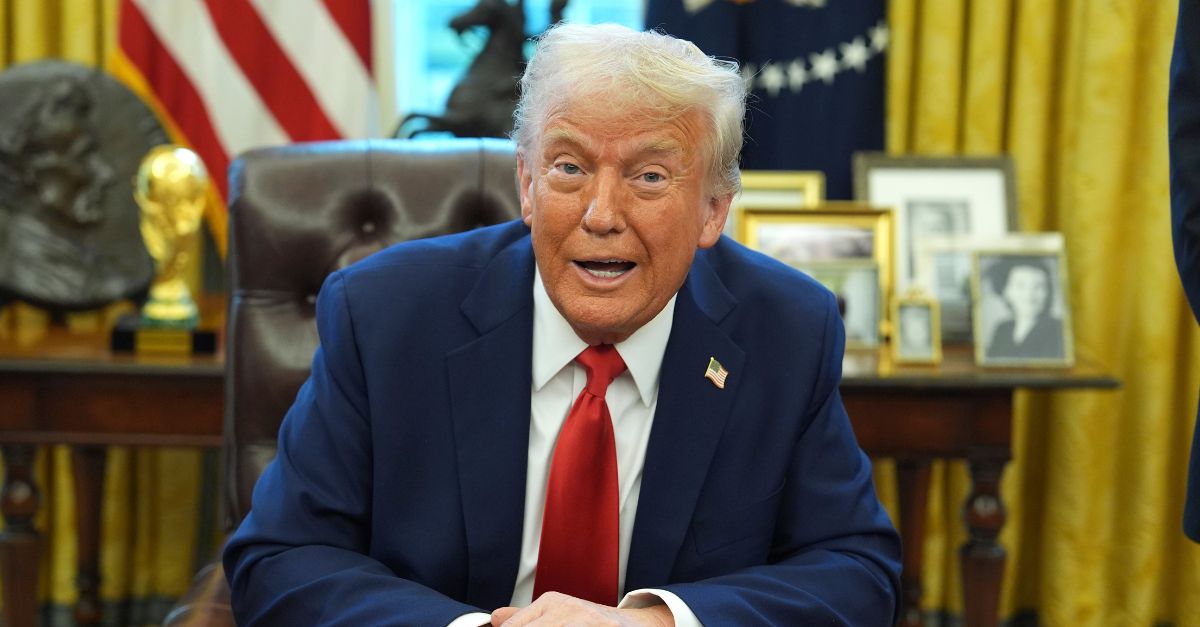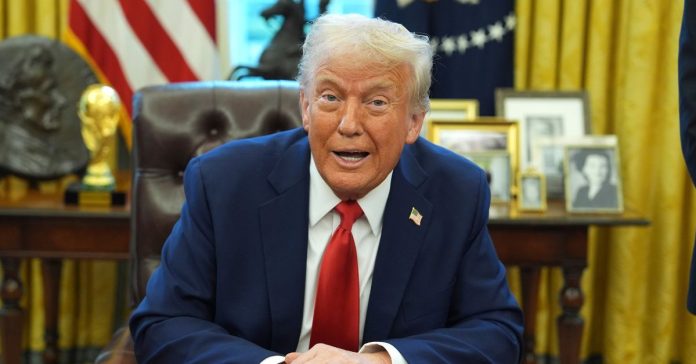
President Donald Trump speaks after signing an executive order in the Oval Office of the White House, Monday, Feb. 3, 2025, in Washington. (AP Photo/Evan Vucci)
Massive firings by Donald Trump’s administration have purged several federal agencies of thousands of career civil servants, but none more dramatically than in the U.S. Department of Justice.
At least a dozen United States Attorneys have been removed, and hundreds of lawyers and investigators who worked on the Jan. 6 and the Trump indictments face potential firing as well. And there is then the resignation of seven prosecutors who refused the Justice Department order to dismiss criminal charges against New York City Mayor Eric Adams — leading, now, to a temporary delay in a case that is ultimately likely to result in a dismissal given the Justice Department’s unwillingness to prosecute it.
But apart from the removal of experienced and professional attorneys is what appears to be a radical transformation of the Department’s longtime guiding ethos. To many observers, the Justice Department has become under Trump’s regime a terrifying weapon to accuse and prosecute Trump’s enemies and protect his friends. To these observers, “Justice” now means “Trump justice,” not the way justice is defined in the Justice Department’s manual as dependent on the rule of law, an evenhanded approach to the administration of justice, and the requirement that legal judgments be made impartially and insulated from political influence.
So, the big question for defense lawyers is whether — and to what extent — prosecuting federal criminal cases may be different.
For as long as we can remember, most criminal defense lawyers believed they were dealing with fair-minded and nonpolitical federal prosecutors. Lawyers strategized to try to persuade prosecutors that the potential charges were weak on the merits; that the government could not sustain its burden of proof; that a key witness wouldn’t hold up; that the trial jury would be unimpressed with the evidence; that the jury wouldn’t be “outraged” by what would be presented to it; that there was some sympathetic fact about the defendant that might encourage the jury to acquit; or that there was some “nullifying” fact about the case or the victim’s motivations that would undermine the prosecution’s theory.
And if those possibilities didn’t impress the prosecutors, the defense lawyer might frame her arguments to encourage the trial judge — even though the judge may lack the legal authority to dismiss the case based on these arguments — to make rulings that might potentially undercut the prosecution’s theory and possibly lead to the defendant’s acquittal.
Until now, though, the ability to defeat the case preindictment or even prior to trial largely rested in the interaction between the defense lawyer and the government lawyer, and sometimes even higher up within the U.S. Attorney’s Office or DOJ headquarters, often colloquially called Main Justice. The norms and traditions in the Justice Department largely walled off Main Justice from decision-making over prosecutions.
To be sure, different administrations may have instructed their justice departments to prioritize certain matters or de-emphasize the pursuit of certain forms of criminal conduct. But we cannot think of a prior administration that would aggressively participate in decision making for or against prosecution in specific cases. And if an administration strongly disagreed with a particular prosecution, the president could always extend a pardon to the individual defendant (sometimes notwithstanding the objection of the prosecutor). But that was the president’s constitutional right that was somewhat apart from the criminal justice system. And admittedly there have been abuses by many presidents — not just the current one — in their use of the clemency power. Its use, though, has not involved a direct invasion of the justice system.
Today, going forward, it does not appear that the traditional and conventional understandings between the federal litigation adversaries holds true. If the prosecution of Adams or the dismissals of the Jan. 6 defendants are any indication, it appears that criminal defense lawyers should rethink their strategies. They should not limit their efforts to persuade the prosecutors against bringing the case. Shocking to say, the White House or Mar-a-Lago should probably be on the itinerary of the erstwhile — or, perhaps we should say, aggressive — defense lawyer willing to consider all potential initiatives to defend his client. Of course, the President and his aides would not be interested in every case or every defendant whose lawyer manages to somehow get onto his radar, perhaps through some intermediary or confidant of the President — but you never know!
It may be the case that today all federal criminal litigation is transactional. Is there a litmus test for federal prosecutors? How are they to be hired? What are their backgrounds and qualifications? It’s not yet clear whether the merits of a case matter, or how line prosecutors and supervisors see their role. The classic model of a neutral, objective, and nonpolitical government attorney may have vanished.
And looking at it from the other side of the divide — and this may seem bizarre to actually articulate aloud in light of the current Justice Department crisis, demonstrated particularly by the Adams case — a defense lawyer may be ethically obligated to step outside the normal mode of criminal lawyering. The ethical duty of “zealous representation” on behalf of a client in whom the White House may have an interest for whatever reason — justifiable or not — may actually “require” that the attorney take action that he or she might not ordinarily take — that is, to advocate the client’s case not only to prosecutors at the Justice Department, but also directly to the White House itself, if possible.
Yes, in the past an occasional, well-connected criminal lawyer surely has approached the White House confidentially as a bridge to the attorney general, especially when a prosecution of their client might compromise national security. Here, though, we speak of an abhorrent circumstance — a White House potentially open to lawyers for friends — or friends of friends — of the administration who find themselves in trouble with the law.
This state of affairs can only come to an end with an attorney general willing to take her phone off the hook — and how likely is that? Unless she does, criminal lawyers for high-stakes clients with ties of some sort to the White House probably need to add 1600 Pennsylvania Avenue to their “zealous representation” itinerary.
And, oddly, if you can believe it, it might be unethical on their part not to!
Joel Cohen, a former state and federal prosecutor, practices white collar criminal defense law at Petrillo Klein Boxer. He is the author of “Broken Scales: Reflections On Injustice” (ABA Publishing, 2017) and an adjunct professor at both Fordham and Cardozo Law Schools.
Bennett Gershman is a Professor of Law at the Elisabeth Haub School of Law at Pace University, a former prosecutor in the Manhattan District Attorney’s Office, and a Special Assistant Attorney General in New York State’s Anti-Corruption Office.
This is an opinion piece. The views expressed in this article are those of just the author.

